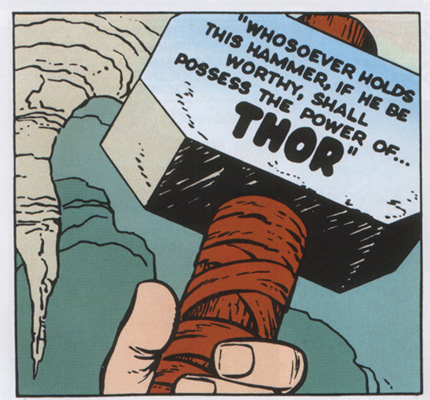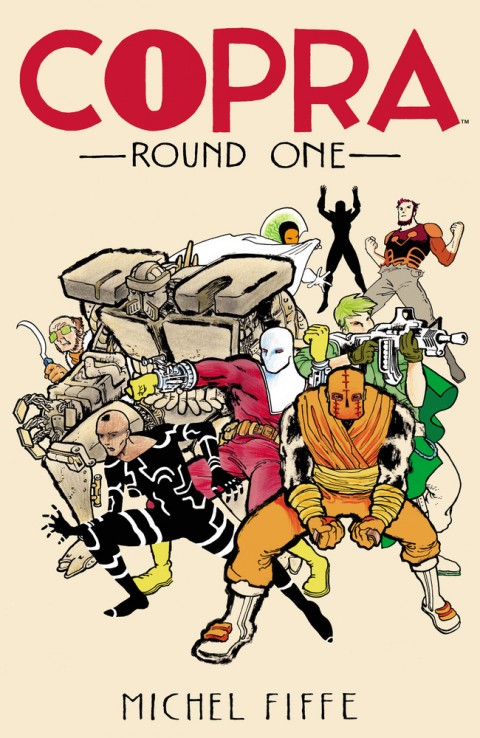Long time readers know that I am a huge supporter of both digital comics and the local comic books store. Many out there believe that you can’t support both. That you need to pick a side and the time is now. Do you want to live in a world where everything is digital and comic book stores don’t exist? Do you? Do you?!
Hyperbole aside, this all or nothing argument is pervasive and is only hurting the industry. Mark Waid recently announced that he was going to try digital distribution with some of his creator owned works. This led to him being accused of trying to destroy print comics, and, by extension, the local comic shop. One store owner in Florida actually announced that he will no longer carry any comics by Mark Waid. Sigh. I almost don’t know where to begin.
I would like to mention that digital comics are probably not the Antichrist. Nor will they spell the end of the local comic book shop. Advancements in technology and new distribution of media historically have been better for an industry not worse. As an example I would like to mention Beta and the introduction of home movie rental. It took Hollywood studios a long time to get on board with allowing the machine to exist (taping stuff from television was copyright infringment in their minds), but eventually they sold copies to video rental stores at high prices. Then eventually the studios sold copies to the general public for a high price which lowered over time. The point is that movie studios saw the Beta machine (or VCR for those of you who have no idea what I am talking about) as something which was going to cause huge losses in their industry. They didn’t see it (at first) as a way to reach more people and make even more money. I know that video stores are hurting now but that is indicative of an inability to change with new technology.
There always needs to be some sort of intermediate step between the producer of media (publisher) and the final customer. For comic books it goes from publisher to Diamond Distributors to some form of retail to the customer. Companies in general are not allowed to control every step from production to sales. Technically monopolies aren’t allowed in Canada and the US (I know I am oversimplifying here; Diamond got around the monopoly problem), but the point is that producers of media would not really be able to sell directly to the customer with ease, even if it is a digital platform. You need to be able to reach a customer so the money saved by cutting out the retail store would need to be invested in advertising. But, for arguments sake, let’s say that print comic books die and that every comic book is now digital, and the customer would buy digitally right from the publisher. Would this kill the local comic book store?
Definitely not. The local comic book store has needed to reinvent itself several times over the last 30 years. They have gone from carrying only comic books, to having extensive silver and gold age collections, to adding toys, t-shirts, and games to their shelves. Fans (and young fans who don’t fear the digital bogeyman) will still want to visit a store to buy toys and t-shirts of their favourite characters. You can’t buy a digital shirt (I know you can, but you know what I mean). In addition, collected paper trades of digital comic books will still sell. Comic stores don’t sell comic books; they sell a hobby. And this hobby changes over decades and stores need to adapt. And successful stores do adapt.
I subscribe to Marvel Digital Unlimited. This has caused me to buy more physical comic books, not less. Comic book stores should be pushing for an actual way to support and promote digital sales. They should not be trying to discourage it. I have mentioned this before, and, at the risk of sounding like a broken record, I will again: the comic book industry should follow what the video game industry has done with Microsoft Points and Sony Playstation dollars. The publishers should allow a comic book store to sell cards for various dollar values that can be redeemed online. The percentage that a comic book store makes should be the same as the do for paper comic books. So as a customer I go into my local comic shop. I buy a $20 card of Marvel bucks; I pick up a snazzy new X-Men shirt while I am at it. Then I go home and use the $20 card to purchase some comics from Marvel digital. Who wins in this scenario? Marvel gets more sales, the shop gets 2 sales, and I now have more comic books to read and a new shirt to wear.
Digital comics promote comics. And local comic book stores should be promoting comics books in all forms: digital, paper, small press, local, the big 2, everything. And because comic book stores promote comic books the publishers should be working with them to allow for a sustainable and mutually beneficial method of delivering digital comics to customers.





Digital did wonders for Blockbuster and VCRs… so yeah, I see what you mean.
No DVD ended the VCR. And Blockbuster failed to adapt. Netlix could have been blockbuster netflix but they didn’t see the shift in distribution. In addition when it costs as much to buy a DVD from Future Shop as it does to rent from Blockbuster that hurts your product. Blockbuster clung to an old model.
Comic book stores would do well to see Blockbuster as a warning on failing to adapt, but the main difference is that there will always be comic book fans who want to read and collect the real, paper product. But if you can reach new customers though digital why wouldn’t you do it?
Speaking of digital… in the news this morning is the antitrust law suit against Apple and 5 big publishers. You can read the filing here:
http://newsandinsight.thomsonreuters.com/uploadedFiles/Reuters_Content/2012/04_-_April/e-books_complaint.pdf
On the surface, is seems like justice is being served but some critics will argue that the whole antitrust system is misguided to begin with. Do antitrust laws punish success? Perhaps… Either way, Marvel and DC should take note… cause personally, I refuse to pay the same price for digital that i would print.
Fascinating. However, price-collusion in one thing but what I find far more interesting is your stance on refusing to pay the same price for digital as you would for print, a point of view that many share (even myself to a certain degree).
There is a sense that digital is less than print (you can’t hold it in your hand or resell it for example) and therefore should cost less than print. But that isn’t necessarily the case. A company might save on printing costs but there are still expenses associated with producing a digital comic. And because digital is growing these cost might actually be greater than the cost of print.
However, as digital comic sales increase the cost should be reduced. And digitizing older comics (for which no royalties are paid to creators) will have a different cost associated with it.
That is why I am such an advocate for a Marvel Bucks card. Local comic shops and publishers would both be making money off of digital in that scenario. Both parties are needed to eliminate the sense that digital comics are less than print. You are the key customer that they should be trying to convince. Not to get you to stop buying print comics, but to convince you to also buy digital.
Ignore the “punishing success” dodge on that one Charlie. That’s a conservative idiom for “I should be able to do anything I want to do to make as much money as I want regardless of who I have to step on.” Anti-trust laws protect consumers and the nation’s economic health by dealing with the greed and avarice in America’s economic system. It’s imperfect, but we are better off with it than without it.
Until digital comics are available in a DRM free format mass adoption will not happen. Remember when digital music had DRM restrictions and you could only play it on certain authorized devices. A nightmare that we’re now free from; you buy it, download it in an open format and play it wherever you want.
Digital comics right now are controlled by the publishers; you’re locked into their platform. I have several Dark Horse digital purchases that I have to view in their App or website. I can’t download them as a PDF or CBR and do what I’d like with the material I’ve purchased; it’s more like a rental. Graphic.ly just announced they’re closing down their platform and you’re basically screwed.
I am amazed at how the comic industry has not learned from the music and movie/tv industry on digital distribution.
No need: Comixology’s monopoly has it all sewn up.
I agree with you in principal but if companies do have more freedom… couldn’t it lead to more innovation? What if a company becomes successful responsibly, without stepping on anybody. They’d have more buying power which they could use to shut out their competition.
Just to play devils advocate… why should our tax dollars go to prop up a business that is weak or dependant on subsidies?
We’ve visited this topic many times… intellectual work remains the same whether digital or print but, the bulk of the cost comes from production and distribution. Reduce the production and distribution by 99% and the end cost should come down accordingly. That’s why Microsoft was such an amazing success. Once all the programming was done… it cost them literally pennies to put Windows on CDs. They had one of the fattest margins in the history of business. There is no reason why digital should cost as much as print.
This topic is a bit like the TV stations fighting over who owns the channels. It’s moot considering that there are less and less viewers. Digital is inevitable, but I don’t believe the current form offers any value. Perhaps once it takes on a more “app” like function or a rudimentary animatic where digital is more meaningful, but I wont be buying any scanned pages.
Marvel and DC have bigger issues to address before digital can really take hold like illegal downloads, an aging audience and sustainability.
Here’s the latest on Apple vs Amazon:
http://finance.yahoo.com/news/amazon-cut-e-book-prices-104805832.html
It really is a complex issue… The spirit of the law has good intensions but I can’t say for sure what’s right or wrong here. Amazon has been hugely successful as a “first mover” in the area of eBooks… They should be challenged but how do you take on a giant without help or cooperation from others. Is this not the strategic thing to do? It’s not much different than Google teaming up with others OEMs to take on Apple with Android…
The problem is, there is no clear villain and because of easy replication, digital tends to devalue content… Commoditizing what many consider to be an art form. If I was an old timer, I’d say technology was the villain but how can advancement be bad… If progress is to be blamed, then we’d have to revisit the Gutenberg press and the invention of the assembly line.
“Clouded the future is…”
– Yoda
Here’s a simplified write up of what’s at stake and pretty much supports what I’ve been saying about digy comics:
http://www.ft.com/cms/s/3/939c8348-84c4-11e1-a3c5-00144feab49a.html#axzz1rr7a6ilf
So who’s the monopoly here… Amazon, who’s willing to sell at a loss (because only they can) to put the squeeze on the competition, or Apple for trying to standardize pricing for a product that cost very little to produce and distribute. How does one determine the value of an intellectual product?
Enquiring minds wanna know.
Minus the snarkiness Charlie is right. The medium will not fail, but the actual sellers will. That’s why the LCS owners are so angry. They can see the writing on the wall.
The best run LCSs might be savvy enough to open their own digital shops, but most of them are going to go the way of the milkman.
Once the medium moves to digital, you’ll see prices drop and readers increase. And once readers increase you’ll see ad support and even lower prices.